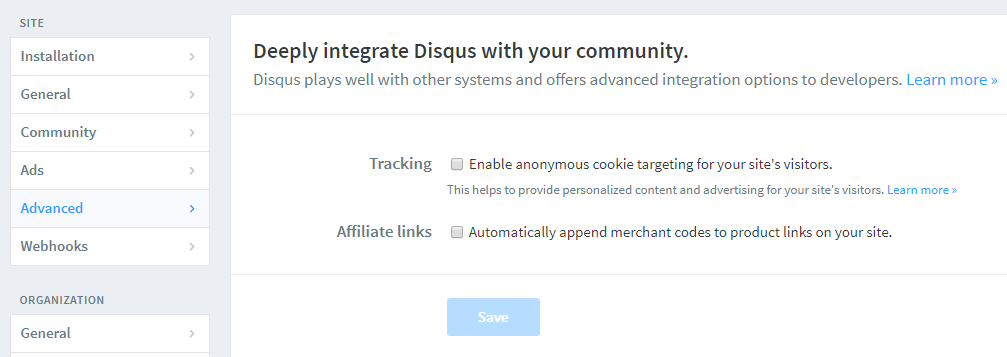Having a suitable comments section on your website is crucial to interact with your customers and establish your authority in the industry. From the SEO point of view user generated content is liked by search engines and carries high SEO value. The inbuilt comment section can be very resource intensive in terms of server load. The posts that have lots of comments increase the load time of the webpage. The server load also increases if multiple users are leaving comments at the same time. The third party commenting system like Disqus and Facebook eases away that server load. The two most commonly used comments system are Disqus and Facebook comments plugin.
Disqus Vs Facebook Comments

Pros and Cons of Disqus comment section-
Disqus comments Pros-
1) Google Index- Google indexes disqus comments, which adds SEO value to it.
2) Real time Discussions- Users can have real-time discussions and create multiple comment threads.
3) Multiple Sign in Options– Visitors can sign in using multiple accounts from Facebook, Twitter, Google, Yahoo, and more.
4) 301 redirect is Available- If you ever decide to change the URL of your webpage you can easily re-direct the disqus comments from old URL links to the new URL by using a 301 re-direct to keep the comments and search engine rankings intact.
5) Not blocked by companies/organizations– Disqus comment section is usually not blocked at workplace or by companies or organization offices. The employees and staff can easily access the comments section.
6) Import and Export– Disqus Comments can easily be imported and exported.
7) Discovery Feature- The Discovery feature of Disqus displays related content or posts from your website to visitors. The users can find further content on your website which increase the time spent on your website.
8) Spam Security- Disqus needs it’s user to go through email verification which helps curb the spam. It also has robust spam detection algorithm in place to remove spam accounts and all spam comments. If you own a wordpress website you can integrate Disqus easily with ‘Akismet’ which is WordPress default spam filtration tool for additional spam protection.
9) @mention- Visitors can use @mention in disqus comments to point the comment toward other disqus users or twitter account holders.
10) Email Moderation- Disqus automatically sends an email to the moderators when someone leaves a comment on the post. The moderator can directly reply to the comment using the ‘Reply’ button on the email. The moderator can also click ‘Delete’ to directly delete the comment via email.
Disqus comments Cons-
1) Requires plugin installation– Every third party plugin including disqus comment plugin tends to slow down the page and reduce text to code ratio of the webpage. Proper installation of plugin and regular updates are required for it’s proper functioning.
2) Design is not customizable– Disqus gives you the option to choose between it’s light and dark color schemes, but other than that you can do little to customize the comment section to match the look and feel of your website.
3) Can’t @mention Facebook– Disqus does not allow the visitors to @mention Facebook friends or pages. You can @mention disqus users and Twitter users though.
4) Audience Analytics- Disqus provides a centralized analytics of the comments on posts and visitor engagements on the dashboard. Advanced audience analytics however is available only on premium accounts.
5) Disqus Ads– For the free Disqus plan subscribers, there is an option to disable the ads under settings>> Ads>> Ads configuration. The larger, commercial websites can either choose to opt for a paid disqus plan to remove the ads in comment section or display the ads and earn revenue through the Disqus Reveal program. At the moments ads remain optional for over 95% of websites using Disqus.

6) Disqus Affiliate links– You can choose the disable the affiliate links by disqus by disabling Affiliate links located under settings>>Advanced>>Affiliate links.

When to Use Disqus comment system–
- If you have large amount of Audience who would like to have real-time discussions.
- Your traffic source or audience demographic is not necessarily facebook users.
- You plan to change post URLs or 301 redirect them in future and/or plan to migrate your website from http to https.
- Your visitors include companies or organizations where social networking sites like facebook are usually blocked.

Pros and Cons of Facebook comment plugin-
Facebook Comment Pros-
1) Spam Security- Facebook required real names and identities to comment which greatly reduces the number of spam in comments. Facebook has it’s own advanced algorithm to block out spammers.
2) Social virality- Installing facebook comment section can boosts traffic by increasing the potential of post sharing or tagging their friends which creates a feedback loop between Facebook and website posts. Facebook gives “Also Post on Facebook” for users who want to display their comments on their facebook profile.

3) Facebook Sign in- Users are automatic sign-in into the comment section if they are already signed into their facebook account elsewhere. Also if the users have facebook accounts they are not required to register or verify their email.
4) Direct Facebook comment- The comment section on your website is directly connected to users facebook account. They can easily, read and respond to comments directly from facebook accounts without being present on your website.
5) SEO Friendly- Most of the search engines can now index facebook comments which increase the SEO value of webpage in terms of user generated content.
7) Analytics- Facebook provides you a more detailed audience analytics data for free.
Facebook Comment Cons-
1) Limited to Facebook Audience- The people who do not prefer to use Facebook or have Facebook accounts can’t comment on your website.
2) Lack of trust- People are wary of commenting on facebook comments or share profile on other websites. Some like to be anonymous. Facebook comments can give the websites and it’s visitors access to customer profile data which some might consider breach of privacy.
3) Customer backlash– User/user’s friends may be surprised to find their replies on another website, if they are unknown to the fact that Facebook syndicates data back on the website comment section. This can cause quite a backlash.
4) No 301 redirect– Once the facebook comment section is fixed on your webpage the URL in Facebook’s graph is fixed. If you change the URL you will lose all the comments, likes and shares. There is no option to 301 redirect the old URL to the new one.
5) No backups– Once you install the facebook comments plugin you can’t leave it or transfer the comments. There is no backup facility. All data will be lost.
6) Blocked by company/organizations– If facebook is blocked by the visitor’s company or organization, the visitor won’t be able to access the comment section.
7) Email Moderation- Unlike Disqus, facebook provides no email moderation facility.
8) Restricted @mention- Facebook allows you to @mention only people with Facebook accounts.
9) Requires a plugin installation. Similar to disqus, facebook plugin tends to slow down the page loading time.
10) Real-time Comments- Facebook comment section does not allow real time comments or discussions.
When to use Facebook comment plugin-
- If your audience demographic comprises mostly of facebook users.
- Your website content is highly sharable and social virality is most important for you.
Comment section for Product Pages on E-commerce Website-
Comment section is generally not placed on product pages because it tends to dilute Reviews and Question/Answer sections. Most of the ecommerce companies and marketplaces like Amazon do not have comment section on their product page. It is not standard practice for ecommerce websites. Comment sections are primarily for blog, news and magazine article websites.

Hunaid Germanwala is a digital marketer and content creator at Health Products For You since 2014. He has an MS from Ulm University in Germany. His mind is always buzzing with creative ideas and is eager to explore new perspectives. His motto in life is “Better to Light the Candle than to Curse the Darkness.”














Thanks for the very informative articles.
Super cool post!